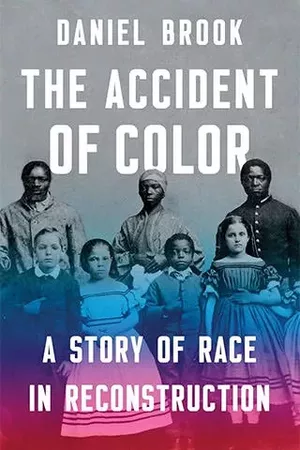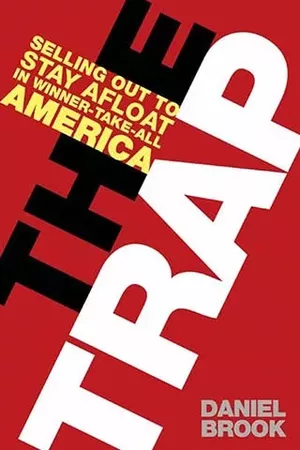Q & A with Daniel Brook on *The Trap*
This interview with Daniel Brook first appeared in slightly different form in Cool’eh magazine and appears here by their kind permission.
Did the ideas that would eventually turn into this book start to gestate while you were still in college?
It came together post-college, but yeah, it started in college. When I was at Yale, for a semester I did the teacher preparation program; I was gearing up to be a high school teacher. While I was doing that, I was working on the student magazine. I realized I liked journalism better than teaching—I ended up picking a different low-paying job. But once I got out [of college] it became clear that, if you become a teacher, you’re in for a difficult financial existence if you do it in any of the major metropolitan areas.
So that’s where it started. And then watching friends, watching people I know sell out after school, really drove the point home. Junior year, I did this program sponsored by a liberal think tank—‘liberal policy camp.’ It was more fun than it sounds—they had kind of lax drinking-age regulation, so it was OK—and we studied inequality from the perspective of: ‘You know the facts, you guys are going to have your fancy degrees, you don’t have to worry about this, but you’re all liberals; you’re going to care about people at the bottom.’ But when these people [who attended the camp] all became corporate lawyers, I was like, ‘Whoa, inequality is totally our problem.’ We just didn’t see it. The point of the book is to reconstruct how the country got where it is now so quickly, from a very different point not so long ago.
Right, the system that’s creating this inequality is relatively young. Even though a lot of the ideas behind it didn’t start with Reagan, it was his administration—
Reagan is the electoral triumph of an intellectual and political movement that started earlier, but yeah, it’s only with Reagan that all of their policies begin to get implemented, and then Bush has been trying to push them even further.
To what extent do people our age need to be reminded how young this system is?
I think that’s huge. In some ways I hope the biggest service the book does is show people that it wasn’t always this way; it doesn’t have to be this way. And it’s amazing the reactions I get when I just tell people facts. I mean, I don’t mind if I tell someone my opinion and they disagree, but I’ll tell people facts and they look at me like I dropped down from Mars. I’ll tell someone that under Eisenhower—a Republican president—the top marginal tax rate was 91 percent, and they’ll look at me like I’m making this shit up. Or I’ll say the public and private sectors used to pay their lawyers equally, in 1970, and they’ll look at me like I’m making it up. And I just say no, that’s a fact. If you want to disagree with my opinions, go right ahead, but you can’t disagree with that fact…
The intro ends with a sort of grudging admiration for the [Barry] Goldwater Right, where they came up in this New Deal era, and they had intellectual objections to it, and they weren’t afraid to make them even though it seemed like getting the boulder back up the hill would be impossible. And because they weren’t afraid to try, they actually succeeded.
Were there points when the scope of what you were trying to do was overwhelming? In order to criticize an entire system effectively, there must be a huge amount one has to consider.
Let alone that it was the first time I’d ever written a book. Even if I were just writing a biography of Britney Spears I’d probably feel overwhelmed. But yes, the idea of trying to criticize an entire system was at times overwhelming; I just had the faith that—especially from reading conservative intellectuals such as Milton Freidman and Friedrich August von Hayek—that it was a system, and it all fit together, that inequality is one side of the coin and that rising housing prices and college tuition and no health insurance is the other side of that coin, and it’s all coherent if I can just pull it together right. Hopefully some people think I did.
If you had to identify the audience for the book, who would it be?
If anyone wants to read the book I would be happy. In the intro, I call our generation the coal mine canaries of Reaganomics. We’re the people who solely grew up in this system, and we’re not grandfathered in. I feel like my parents were grandfathered in—my mom’s now retired, my father is not. They were public service professionals, and they could make a life in the New York area that is no longer viable. But they bought their house in 1977, they were grandfathered in, so what does it matter to them?
That’s why I’m writing about young people, and I think because I’m writing about young people it will appeal to young people, but when people think it’s a book only about young people, it’s frustrating. I have a friend who’s a neuroscientist and his experiments are on fish, and people say, ‘Oh, I have a problem with my fish, can you tell me about pet food?’ And he’s like, ‘No, no, no, I study neuroscience. I just look at fish because that’s what I do my experiments on.’ I feel like I’m writing about politics and economics; I’m using young people because their experience can tell us a lot about the political and economic changes that were put in place by Reagan.
It occurs to me that the ascendancy of this conservative ideal of the free market equaling freedom hasn’t been perceived as a failure because the generation basically responsible for it, on whose watch it rose, were able to raise their children and buy houses before the inequality reached a fever pitch. And in a lot of cases, they’ve quite happily seen an enormous return on their real estate investments.
I agree with that. I remember my grandfather—who has passed away, whom the book was dedicated to—I don’t know if it was Reagan or Bush the first, but about some kind of economic plan they put forward, he said, ‘It’s murder on the middle class; they just don’t know it yet.’ I think he was right. It’s even beyond that—it’s suicide of the middle class; they just don’t know it yet.
Look at Reagan as the governor of California, which in some ways was like the mini–social experiment that was then applied nationally when he became president. The idea that high taxes were eroding what was called the “California Dream,” the sunny American dream where you could have your own house, and if your kids were sharp they could go to UCLA or Berkeley for free. The idea that taxes were eroding that, at this point, seems nuts when you look at California these days. It’s clear that the taxes were not the problem.
How important do you think it is that we convince our parents’ generation, and even older Americans, who happen to have control of a lot of the halls of government, that the current system isn’t working? Do we need to convince them, or do we need to just say ‘You guys are getting old; it’s going to be our country soon,’ and rely on that fact.
The people I worry about convincing are not my parents. A lot of us are the children of the ’60s generation; these people remain liberal, and a lot of people who vote for this stuff are evangelicals in Kansas. We need to problematize the whole system and look at it more broadly, rather than nitpicking at certain issues. But again, part of what turned me on to the ideas in the book is that the system is administered by people who don’t even believe in it. In the book I have a liberal lawyer who ends up working at a firm that defends Unocal’s use of slaves in Burma. If they needed to find people who believed in slavery to defend them, there would be a lot less slavery in the world.
In the chapter that deals with lawyers and the legal system, you point out the irony of a group of lawyers who work at a major firm contributing money to the Kerry campaign while they protect Bush’s corporate cronies.
It’s important to blow up the psychologically sustaining sweet little lies people tell themselves. It’s important for people who work as Wall Street lawyers and then make charitable donations—including to John Kerry—to realize they’re doing more harm than good, and just be honest about that. But again, think of it systematically. A lot of those people eventually get addicted to the money—that’s its own thing—but initially a lot of those people really are in debt, and what they want, I would argue, is not luxurious.
My grandparents were both schoolteachers, and they lived in Brooklyn in a truly suburban kind of neighborhood. Their house now sells for a million dollars. You can’t be a schoolteacher and buy that house. If you’re a corporate lawyer and you want a million-dollar house, that’s a schoolteacher’s house. I can’t really fault you; it’s not like you’re living a life of luxury.
You point out in your introduction that corporate America is full of these secret dissenters. You talk in various instances about how well-funded the conservative movement is in terms of its think tanks, public relations arms, and its lobbying abilities. Doesn’t it stand to reason that the money for closing that gap in funding can come from people who’ve had to sell out just to survive, but maybe still harbor liberal ideals?
I certainly wouldn’t begrudge anyone making a donation to a liberal think tank that’s funded by their corporate law job. I think that’s a good place to start. But I do want to use the book to call into question the larger issues. Why do you have to do X, Y, and Z just to have what used to be a middle-class life? Obviously if the Center for American Progress can get to work on that with their donation, I have no objections.
Do you feel I come down too hard on people like the corporate lawyers who are giving money to Kerry?
No, not at all, but I think you’re absolutely right in pointing out how large the discrepancy in funding is. In our sound-bite culture, we know how important not only the message is but the money that gets it out there is. It seems to me that the people from our generation who are managing to make a lot of money, even though they may have sold out initially just to survive, at some point can become an asset.
I’m happy that George Soros gives his money to liberal causes rather than conservative ones, certainly. But the ultimate goal is to have a society where people like George Soros pay taxes and it funds education and health care.
You give the example that people in Great Britain, because they know where their tax money is going, because they know about universal health care and all the different social programs, they feel that taxes should be higher.
I’m self-employed; I’m a freelance writer and I’m lucky I don’t have any serious medical conditions that would preclude me from getting medical insurance. I pay, every month, a fixed fee—although it went up 25 percent this year—to Aetna to get my insurance. To me, it would be a much better system to say if I have a good year in my self-employment, my business, I pay more taxes, and if I have a bad year I pay less, and either way I have my health insurance, as opposed to charging me a flat fee that doesn’t reflect how well or poorly my business is doing that year. We just need a Democrat to say that—why will no one say that? Well, hopefully someone will read the book and say it.
But that’s the thing: once a Democrat does say it, do you think it’s political suicide?
Not with health care, no. My idea in endorsing the British higher-education voucher system—that’s to problematize the whole idea of paying tuition for college, because we’re the only country that does it. A lot of Americans don’t even know that we’re the only country that has more than token college tuition—Canada, Britain, and Australia have very modest tuition. That’s something I just want to throw out there. So in the same way I have a grudging respect for [William F.] Buckley and [Barry] Goldwater, who were willing to throw out these sort of unfashionable ideas—I think that’s where it starts: saying we think the way things are going is wrong, and it needs to change.
The way the Democrats in the primaries are talking about higher education financing makes me want to smack myself. Obama wants to get the private sector out of making the loans because it’s a scam, which is fine; that’s a good policy. Clinton wants to increase the value of a Pell Grant, which is fine, too. But these things don’t affect the real problem, which is that tuition has gotten totally out of control.
At various points in the book, the word entrenched is used. It’s going to be difficult to match the PR and lobbying power of the system currently in place, but also, there are inherent truths in the ideas that you’re presenting, and they would resonate with a lot of people were they to sit down and consider them. But at the same time, as in-debt and struggling as the middle class is right now, do they have just enough to lose that upsetting the status quo is viewed as too risky?
I don’t go to the level of policy-wonk detail of saying, ‘These should be the income tax brackets…’ But we need to raise taxes on the people who are upper-middle-class to very wealthy, not people who are middle-class. And the idea of a threat to the economy, I feel, is in some ways a red herring. You know, we like to say we have a 4 percent growth rate and France has a 1 percent growth rate, but most Americans actually live in France, in that most Americans’ wages are flat or going up 1 percent. The idea that we’ll wreck the economy is a red herring because we’ve already created an economy that works for such a tiny percentage of people. It’s a matter of taking the economic dynamism that seems to only be going to the top and using that engine to make life better for everybody.



